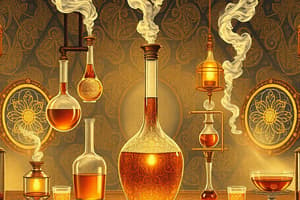Podcast
Questions and Answers
What physical process involves the conversion of liquid into gas at the liquid's boiling point?
What physical process involves the conversion of liquid into gas at the liquid's boiling point?
- Evaporation (correct)
- Sublimation
- Condensation
- Ionization
Which law states that at constant temperature, pressure times volume equals a constant quantity for gases?
Which law states that at constant temperature, pressure times volume equals a constant quantity for gases?
- Legendre's Law
- Charles's Law
- Boyle's Law (correct)
- Dalton's Law
What is the main factor that can facilitate evaporation at lower temperatures?
What is the main factor that can facilitate evaporation at lower temperatures?
- Decreased surface area exposure
- Increased surface area exposure (correct)
- High pressure
- Low humidity
Which law states that at constant pressure, volume is directly proportional to Kelvin temperature for gases?
Which law states that at constant pressure, volume is directly proportional to Kelvin temperature for gases?
How does evaporation contribute to cooling the surrounding air?
How does evaporation contribute to cooling the surrounding air?
In what scenario would high humidity conditions most likely reduce evaporation rates?
In what scenario would high humidity conditions most likely reduce evaporation rates?
Which of the following statements is true about boiling?
Which of the following statements is true about boiling?
What is the primary difference between boiling and evaporation?
What is the primary difference between boiling and evaporation?
What is the term used to describe the heat energy required to maintain boiling?
What is the term used to describe the heat energy required to maintain boiling?
What happens to the boiling point of a liquid at higher altitudes?
What happens to the boiling point of a liquid at higher altitudes?
Which of the following processes is responsible for the formation of bubbles during boiling?
Which of the following processes is responsible for the formation of bubbles during boiling?
What causes the turbulence and heat loss observed during boiling?
What causes the turbulence and heat loss observed during boiling?
Flashcards are hidden until you start studying
Study Notes
Boiling is a physical process where a liquid changes its state into gas due to heat energy. It occurs when the temperature of the liquid reaches its boiling point, which is defined as the temperature at which the vapor pressure of the liquid becomes equal to the surrounding atmospheric pressure. At this point, bubbles form within the liquid and rise to the surface due to buoyancy forces. Evaporation, on the other hand, is a related process where a liquid turns into water vapor without reaching the boiling point, often through increased surface area exposure or lower temperatures. Both processes play crucial roles in various natural phenomena, including weather patterns and the heating of fluids. Here's a more detailed look at each process.
Boiling
Boiling involves the conversion of a liquid into gaseous form due to heat input. This process occurs when the liquid's temperature reaches its boiling point, which varies depending on the specific substance and atmospheric pressure. For instance, at standard atmospheric conditions, water boils at 100 degrees Celsius (212 degrees Fahrenheit). At higher altitudes, however, where atmospheric pressure decreases, water boils at lower temperatures.
When a liquid boils, bubbles form due to the rapid expansion of gas molecules within the liquid. These bubbles rise through the liquid to the surface due to buoyancy forces, commonly causing turbulence and heat loss. The heat energy required to maintain boiling is called latent heat.
Boiling Point Relationships
Boiling point relationships between liquids allow scientists to predict how various compounds will behave when heated. These relationships include:
- Boyle's Law: At constant temperature, pressure times volume equals a constant quantity for gases.
- Charles's Law: At constant pressure, volume is directly proportional to Kelvin temperature for gases.
- Legendre's Law: At constant temperature, the vapor pressure over a liquid is inversely proportional to the radius of curvature of the surface over which it condenses.
Evaporation
Evaporation describes the process where a liquid turns into water vapor without reaching its boiling point. This often happens due to increased surface area exposure, such as when water evaporates from a pool on a hot day. In the context of boiling and evaporation, lower temperatures can also facilitate evaporation.
Evaporation is an essential process for maintaining homeostasis within an organism. For instance, the body's core temperature remains relatively constant by shedding heat through sweat evaporation. It also plays a vital role in a plant's water economy, with stomatal closure being an important mechanism to control transpiration rates during periods of high evapotranspiration demand.
Evaporation Cooling
The cooling effect of evaporation occurs due to the endothermic nature of the phase transition from liquid to gas. When water evaporates, it absorbs energy from its surroundings, thus reducing the surrounding air's temperature. This is why we feel cooler after sweating on a hot day, as the evaporation of sweat helps to remove excess heat from our body.
Evaporation and Humidity
Evaporation is also closely related to humidity, which is the amount of water vapor in the air relative to its maximum capacity. High humidity conditions can reduce evaporation rates, as the air is already saturated with water vapor.
In summary, boiling and evaporation are two closely related physical processes involving the conversion of liquid into gas. While boiling requires heat input to reach the liquid's boiling point, evaporation can occur at lower temperatures due to increased surface area exposure or other factors. Understanding these processes is crucial for various applications, including maintaining homeostasis in living organisms and predicting weather patterns.
Studying That Suits You
Use AI to generate personalized quizzes and flashcards to suit your learning preferences.




